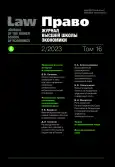The Role of the Constitutional Court of the Russian Federation Decisions in Development of Labor Legislation (to 20th Anniversary of the Labor Code of the Russian Federation)
- Authors: Filippov V.1
-
Affiliations:
- Russian Presidential Academy of National Economy and Public Administration
- Issue: Vol 16, No 2 (2023)
- Pages: 165-189
- Section: Russian Law: Condition, Perspectives, Commentaries
- URL: https://journal-vniispk.ru/2072-8166/article/view/318244
- DOI: https://doi.org/10.17323/2072-8166.2023.2.165.189
- ID: 318244
Cite item
Full Text
Abstract
Based on analysis of the Russian Constitutional Court decisions issued from 2002 to 2021 inclusive, author examines influence of legal positions developed by the Constitutional Court on the Russian Labor Code. The paper presents a classification of the decisions of the Constitutional Court adopted following the results of the verification of compliance with the Constitution of the Russian Federation with the norms of the Labor Code. The paper presents data that show that in the last 10 years the role of the Constitutional Court in influencing labor legislation has increased significantly. The author identified six final decisions of the Constitutional Court that recognized certain provisions of theLabor Code inconsistent with the Constitution, fifteen decisions that are interpretative (explanatory) in nature, four definitions with positive content and four more with quasipositive content. The paper analyzes the importance of the legal positions contained in these decisions for labor relations. The author has identified the most popular norms of the Labor Code are most often challenged in the Constitutional Court. These turned out to be the norms on the deadlines for applying to the court and on dismissal due to a reduction in the number or staff. The paper shows how such dynamics affected the legal regulation of these types of relations, in particular, the development of judicial positions of the Supreme Court of the Russian Federation from the point of view of recognizing a valid reason for missing the deadline for going to court as filing a complaint against the actions of the employer to the prosecutors office or labor inspectorate. Through the prism of the legal positions of the Constitutional Court the norms on dismissal by reducing the number or staff are studied, the subject composition of applicants is analyzed, it is established that the prevailing number of legal positions of the Constitutional Court is formed on the basis of appeals from employees and only a small part on appeals from employers, courts, trade unions and deputies of representative (legislative) bodies of the members of the Russian Federation. The conclusions presented in the paper can be used as a basis for legislative work in terms of improving labor legislation, as well as for theoretical studies of the impact of the role of the Constitutional Court of the Russian Federation on the legal regulation of labor relations.
About the authors
Vyacheslav Filippov
Russian Presidential Academy of National Economy and Public Administration
Email: noreply@hse.ru
ORCID iD: 0000-0001-7288-9126
Lecturer
References
- Aleksandrova M.A. (2014) The way to resolve a long dispute about legal status of the Constitutional Court of the Russian Federation decisions. Vestnik Novgorodskogo universiteta=Bulletin of Novgorod University, no. 2, pp. 60-63 (in Russ.)
- Brezhnev O.V. (2021) Resolving cases without hearings in the Constitutional Court of the Russian Federation. Administrator suda=Court Administrator, no. 2, pp. 42-46 (in Russ.) DOI:https://doi.org/10.18572/2072-3636-2021-2-42-46
- Ershova E.A. (2008) Sources and forms of labor law in the Russian Federation. Doctor of Juridical Sciences Thesis. Moscow, 491 p. (in Russ.)
- Gadzhiev G.A. (1999) Legal positions of the Russian Constitutional Court as a source of constitutional law. Konstitutsionnoe pravo: vostochnoevropeiskoe obozrenie=Constitutional Law: Eastern European Review, no. 3, pp. 81-85 (in Russ.)
- Gadzhiev G.A. (2012) Commentary to Constitutional Law “On the Constitutional Court of the Russian Federation”. Moscow: Norma, 671 p. (in Russ.)
- Hohlov E.B. (2003) Judicial acts as a source of Russian labor law. In: Judicial practice in the Russian legal system. Saint Petersburg: University Press, 256 p. (in Russ.)
- Hohryakova O.S. (2006) Legal positions of the Russian Constitutional Court and their significance for legislation on labor and social security. Voprosy trudovogo prava=Labor Law Issues, no. 9, pp. 17-19 (in Russ.)
- Kalinovsky K.B. (2010) The significance of the “refusal” definitions of the Constitutional Court for understanding and applying norms of criminal and criminal procedural law. In: Constitutional issues of criminal law and process: International conference papers. Saint Petersburg: Petropolis, 368 p. (in Russ.)
- Lazarev L.V. (2003) Legal positions of the Constitutional Court of Russia. Moscow: Gorodets, 528 p. (in Russ.)
- Malyushin A.A. (2008) Precedent value of legal position of the Constitutional Court of the Russian Federation. Zhurnal konstitutsionnogo pravosudia=Journal of Constitutional Justice, no.1, pp. 35-37 (in Russ.)
- Marchenko M.N. (2008) Sources of law. Moscow: Prospect, 760 p. (in Russ.)
- Mazurov A.V. (2009) Commentary on the Constitutional Law On the Constitutional Court of the Russian Federation. Moscow: Chastnoye pravo, 389 p. (in Russ.)
- Mironov V.I. (1998) Sources of labor law of the Russian Federation. Doctor of Juridical Sciences Thesis. Moscow, 344 p. (in Russ.)
- Presnyakov M.V. (2018) Limitation periods in labor law: words and terms. Zhurnal rossiyskogo prava=Journal of Russian Law, no. 3, pp. 53-65 (in Russ.)
- Sivitsky V.A. (2012) Dynamics of the typology of decisions of the Constitutional Court of the Russian Federation. Pravo. Zhurnal Vysshey shkoly ekonomiki=Law. Journal of the Higher School of Economics, no. 2, pp. 57-73 (in Russ.)
- Vitruk N.V. (2001) Constitutional justice in Russia (1991-2001): essays on theory and practice. Moscow: Gorodets, 507 p. (in Russ.)
- Vitushkin V.A. (2005) Definitions as a type of decisions of the Constitutional Court of the Russian Federation. Zhurnal rossiyskogo prava=Journal of Russian Law, no. 3, pp. 10-19 (in Russ.)
- Zorkin V.D. (2004) Precedent nature of the Constitutional Court of the Russian Federation decisions. Zhurnal rossiyskogo prava=Journal of Russian Law, no. 12, pp. 3-9 (in Russ.)
Supplementary files








